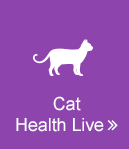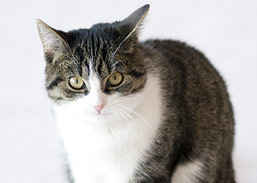One of the basic keys to helping your cat live a long, healthy life is to provide them with a good diet. Most people are not nutrition experts and leave the formulating up to the pet food companies. Pet food companies often claim that their formulas are either designed or recommended by veterinarians and many have animal nutritionists on staff. If you feed your cat a nutritionally complete commercial diet, it is getting everything it needs?
What are the nutrients that my cat requires?
The basic nutritional categories required for survival:
Water
Protein
Fat
Carbohydrates
Vitamins
Minerals
Within these general categories are more specific nutrients including amino acids, fatty acids, and specific vitamins & minerals that truly are essential for wellness. If an cat’s diet is low in even one essential nutrient it can inhibit the animal’s body from effectively completing certain functions. Your cat may have subclinical deficiencies that you do not even know about! Long term deficiencies can take their toll because they train the body to live in crisis mode, making them extra sensitive to their environment and prone to developing allergies. Bigger deficiencies lead to more serious health concerns depending on which nutrient(s) is lacking.
While most cat food manufacturers do a great job providing a complete and balanced diet, there are many factors that can cause your cat to still develop deficiencies for certain nutrients.
Individuality
Pet food was formulated for the average cat. There are a lot of really cool new foods out there that target specific lifestyles, breeds, life stages and conditions, but each one is designed for the average animal in that category. Some cats genetically have higher needs for certain vitamins or minerals than others. Some diseases and medications can cause the body to metabolize certain nutrients faster than usual as well. Everyone’s body has their own internal chemistry & metabolism, is exposed to their own environment and has their own genetic make-up. We call that “biochemical individuality”, which is a fancy way of saying that we’re all unique!
Stability
Feed manufacturers achieve their desired nutrient levels by adding food ingredients (like meats or grains) and by adding vitamins & minerals. Regardless of the source of these nutrients, many materials are sensitive to outside factors such as oxygen in the air, sunlight, water and heat. While the initial recipe could be ideal, nutrients can degrade during the manufacturing process and shipping. Heat is especially concerning because many manufacturing processes include heat. Shelf life is another important factor because the potency of nutrients will decrease over time.
Availability
Just because a formula contains a vitamin or mineral that you know your pet needs does not mean that the nutrient is actually accessible by your pet’s body. Minerals are often culprits because not all forms of minerals are bioavailable. Whole food supplements for vitamins and minerals such as algae, brewers yeast or vegetable powders can be good options because the nutrients tend to be more easily assimilated by the body, but are not always as potent or stable as purified options. Always read the ingredient list so you know where the nutrients are coming from to ensure they are healthy sources!
Feeding Directions
Pet parents who buy high end, all-natural (read: expensive) food for their cats can review the Guaranteed Analysis and Ingredient list to see that everything looks perfect. But often times once you notice the feeding directions things do not add up. One popular premium brand of cat food’s label says to give 1 can per 7 lbs of body weight. That means an average 13 lb cat should be getting 2 full cans per day! The pet food company suggests feeding over 4 times the volume of what a vet recommends because that is the amount of food needed to hit those ideal nutrient levels. If you were to follow the directions exactly your cats would all be grossly overweight and very unhealthy. Even though the food uses high quality, bioavailable ingredients pets could be lacking the nutrients they need because they were not getting enough of them.
The easiest way to ensure that your cats’ nutritional needs are met is to give them a multi-vitamin or other nutritional supplement. If in doubt, always ask your vet! Your veterinarian will be able to assess your pet and all of his or her individual needs based on their age, breed, genetics and activity level to help you decide which food and supplements are right for your cat.
Studies
Vitamin D metabolism and rickets in domestic animals.
A novel CYP27B1 mutation causes a feline vitamin D-dependent rickets type IA.
Diet and skin disease in dogs and cats.
Effects of linoleate and arachidonate deficiencies on reproduction and spermatogenesis in the cat.
Addressing nutritional gaps with multivitamin and mineral supplements.


